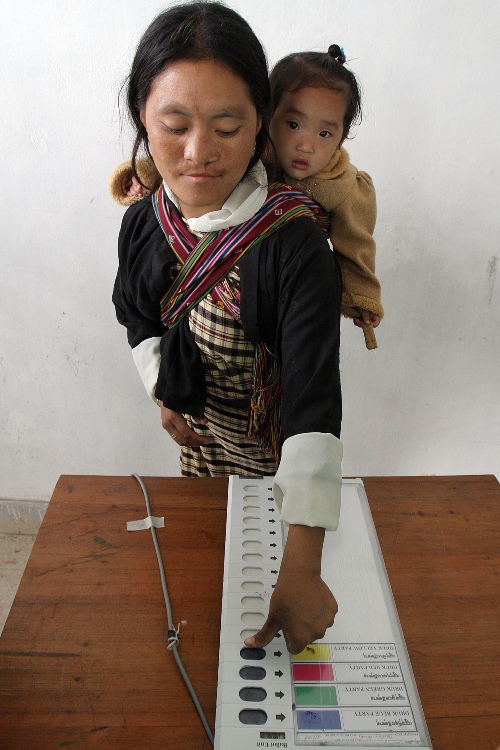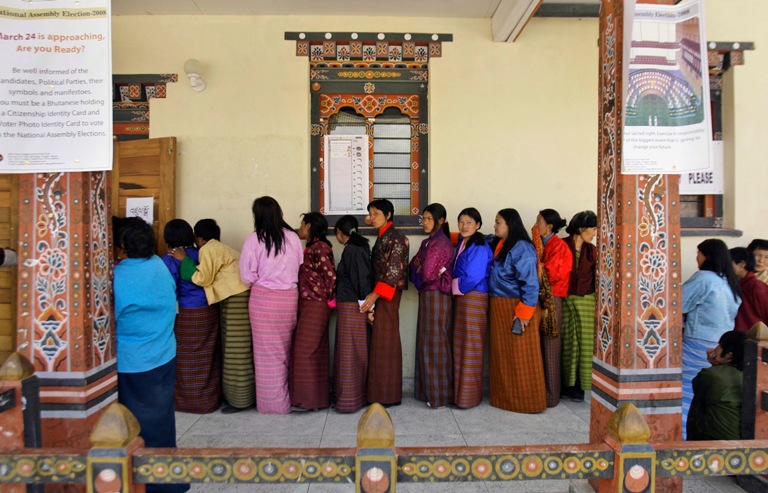Electing Dragons
Women Play Key Roles in Bhutan’s Elections
Until 2008, election law in the tiny Himalayan country of Bhutan allowed only one vote per household. Even though Bhutanese women hold the majority of property deeds and run households, those votes were almost always cast by men.
This year, Bhutan enacted universal suffrage--granting the vote to all adult men and women. Now, women play a critical role in practicing and perpetuating democracy, a fairly novel concept in this ancient kingdom.

Deferring to Tradition
Situated in the Himalayas, the predominantly Buddhist kingdom of Bhutan prizes tradition and the preservation of its cultural identity above all. It did not permit television until 1999, admits only 6000 foreigners per year and strictly prohibits cigarette sales. People are expected to wear traditional clothes for office and public functions, and strict rules protect Bhutan's environment, architecture and heritage. For example, mountain climbing is banned to protect the pristine forests that blanket the country.
Eschewing the traditional use of Gross National Product as an indicator of prosperity, Bhutanese have coined the measure Gross National Happiness, which measures equity, good government and harmony with nature.
In 2005, Bhutan's king announced his intention to abdicate his throne in favor of his Oxford-educated son, and mandated broad sweeping political reforms: by 2008, Bhutan would shift from an absolute monarchy to a constitutional monarchy, in which all citizens could vote. Elected legislative representatives would then have actual rather than ceremonial policymaking authority. Confronted with this change, Bhutan's citizens expressed trepidation.
In a 2007 New York Times interview, Kesang Dorji, 36, summed up the concerns about having to vote: "We have to stand fast to the wisdom of our monarch," he said. "He knows what's best for us. Any normal person would think, ‘Why this, when everything is O.K.?'"
Practicing Voting
The Bhutanese call their country Druk Yul, or land of the thunder dragon. Fearful that Bhutan's citizens would not understand how to participate in the new democracy, the king instituted a mock election so that people could practice voting. In late April of 2007, four fictional political parties, named for colorful Druks, or thunder dragons, the country's national symbol, were put forth: Druk Blue, Druk Green, Druk Red and Druk Yellow. Unsurprisingly, Druk Yellow, which stood on a platform of traditional values, won by an overwhelming majority. For the first time in their country's history, numerous women lined up to vote and served as election monitors.
Women's Wings
In preparation for the real elections in March of 2008, women organized into women's wings of the two major recognized political parties--the Bhutan Peace and Prosperity Party (BPPP) and the People's Democratic Party (PDP).
Lily Wangchuck, head of the women's wing of PDP, sent out an international call for advice from the Internet-based iknowpolitics network, including lessons learned from working in newly formed political parties. The PDP set up a section of its Web site dedicated to discussing women's roles in the party and in a democratic Bhutan. These were creative and daring acts in a country that forbade Internet access--due to its threat to a traditional way of life--until 2000.
In their nascent democracy, women wanted to ensure that their concerns were incorporated into party platforms from the get-go. Such concerns included sexual harassment in the workplace, lack of care for the elderly, support for uneducated and divorced single mothers, and a lack of economical daycare centers for single as well as working mothers. Khandu Om, a female volunteer for the PDP, was interviewed in the blog The Chicknomics Institute, in 2007: "We have women's working groups and several focal persons in a few districts and, at the moment, our main objective is to ensure that women understand their role in democracy."
Initial Victories
In 2008, the real elections lacked the fanfare common in other countries. There were no election posters or campaigners in the town. Voters who wanted to know more about the candidates went to a special notice board in the town center where the candidates posted their picture and a short resume.
In the very first elections for the National Council, or upper house of parliament, three women were elected to the 20 open seats. Also, in the end, none of the six female candidates put forth by the PDP in the Bhutanese National Assembly (the lower house) elections were victorious, but all four of the female candidates of the BPPP won seats.
Disharmony
As much as Bhutan is showing signs of increasing democracy, though, critics say that the country is far from having an outspoken free press or an active civil society. Over 100,000 Bhutanese of Nepalese origin are in internment camps in Nepal after the Bhutanese government crackdown on their agitation for democratic rights in the 1990s. The government prefers to call them illegal immigrants who had to be forced out because they threatened to swamp a small, fragile country of about 700,000 people.
Nevertheless, Bhutanese elections, no matter the results, are likely to have staved off potential antimonarchist rumblings and helped the palace retain its credibility as well as its influence. As newly enfranchised citizens, women will be at the crossroads--and the forefront--of ensuring democracy plants deeper roots in the forest-covered kingdom.


